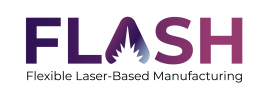
While current state-of-the-art laser systems are optimised for single applications, FLASH will develop a versatile platform integrating three laser sources, enabling multi-wavelength emissions across a broad pulse length regime. This will be combined with dynamic beam shaping in a flexible robotic or CNC cell equipped with three interchangeable beam delivery heads.
Objective
The advent of emerging materials and digital technologies has expanded the product design space to unprecedented levels. However, European manufacturers are struggling to capitalise on this potential due to the limitations of traditional machining tools, which often act as a significant bottleneck to innovation.
Existing machining tools were developed for a more predictable industrial landscape, where stable, single-process workflows remained unchanged for years. To enhance competitiveness and seize new opportunities, the manufacturing industry now requires customisable, multipurpose tools that can be rapidly reconfigured to meet evolving demands.
The EU-funded FLASH project addresses this need. Supported by six large enterprises, six innovative SMEs, two universities, two research and technology organisations (RTOs), and the European Welding Federation (EWF)—which represents over 55,000 companies worldwide—FLASH is set to revolutionise laser-based manufacturing.
Laser-based manufacturing offers inherent advantages over traditional mechanical, chemical, and thermal methods, including greater flexibility, digital control compatibility, and reduced waste generation. While current state-of-the-art laser systems are optimised for single applications, FLASH will develop a versatile platform integrating three laser sources, enabling multi-wavelength emissions across a broad pulse length regime. This will be combined with dynamic beam shaping in a flexible robotic or CNC cell equipped with three interchangeable beam delivery heads.
The resulting system will be futureproof, capable of performing at least 10 macro and micro production processes across all major material types. This innovative platform will empower the flexible, customisable manufacturing of rapidly evolving products across diverse industries.
Industrial Applications
The benefits of FLASH will be demonstrated in key sectors, including:
- Automotive: Improved process efficiency in the production of car cross beams.
- Medical: Enhanced precision and adaptability in manufacturing hip implants.
- Mobility: Optimised production of electric motor hairpins.
- Tooling: Advanced manufacturing of micro drills and super-abrasive grinding wheels.
In each of these applications, FLASH is expected to deliver significant reductions in process time, costs, and energy consumption. Additionally, the platform will unlock new product possibilities through design modifications and material substitutions that are unachievable with current technologies.
By bridging the gap between innovation potential and practical application, FLASH will redefine the manufacturing landscape and provide European industries with the tools they need to thrive in a rapidly changing world.
